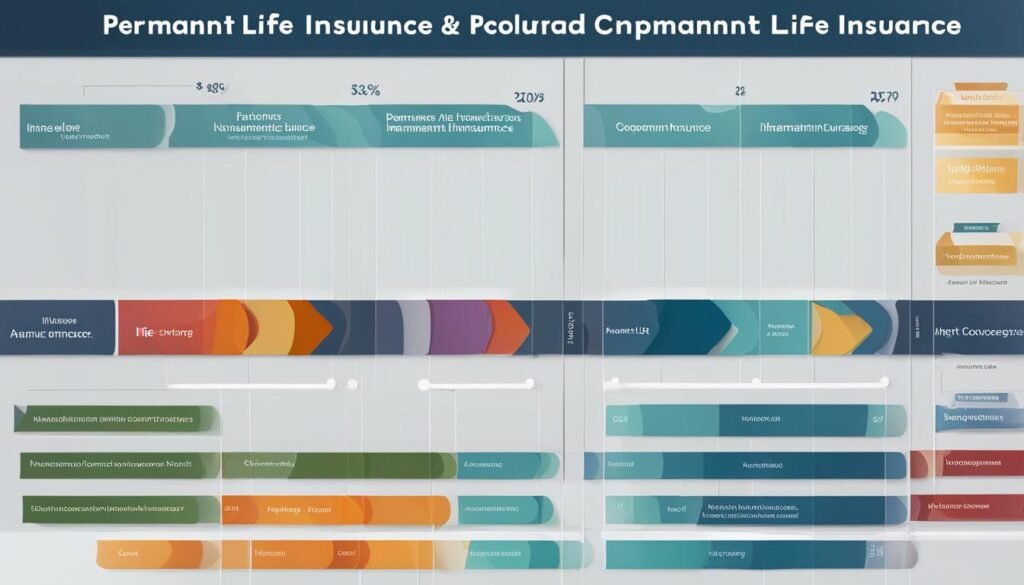Life insurance nationwide is a crucial investment to ensure the financial stability and peace of mind for your loved ones. Nationwide offers a range of life insurance policies to meet your individual needs. With the help of their life insurance specialists, you can customize a policy that provides the necessary protection for your family.
Key Takeaways:
- Life insurance is essential for protecting your loved ones financially.
- Nationwide offers a variety of life insurance policies tailored to your specific needs.
- Expert life insurance specialists at Nationwide can help you customize a policy that suits your family’s requirements.
- Investing in life insurance provides peace of mind, knowing your family will be financially secure.
- Contact Nationwide today to take the first step in safeguarding your family’s future.
Types of Life Insurance: Term and Permanent
When it comes to life insurance, there are two main types that you should be aware of: term life insurance and permanent life insurance. Each has its own set of benefits and features, so it’s important to understand the differences before making a decision.
Term Life Insurance
Term life insurance provides coverage for a specific duration, such as 10, 20, or 30 years. It offers a death benefit to your beneficiaries if you pass away during the term of the policy. This type of insurance is typically more affordable and can be a good choice if you have specific financial obligations or a limited budget. However, it’s important to note that term life insurance does not accumulate cash value over time.
Permanent Life Insurance
Permanent life insurance, as the name suggests, provides coverage for your entire life. It includes options such as universal life insurance, whole life insurance, and variable life insurance. Permanent life insurance policies not only offer a death benefit to your beneficiaries but also have a cash value component that grows over time. This means that as you pay your premiums, a portion of the money goes into a savings or investment account within the policy. This cash value can be accessed during your lifetime, providing additional flexibility and potential for growth.
When deciding between term and permanent life insurance, consider factors such as your financial goals, budget, and the length of coverage you need. It’s also a good idea to consult with a life insurance specialist who can help guide you through the decision-making process and customize a policy that meets your specific needs.
Benefits of Life Insurance
Life insurance offers numerous benefits that provide financial protection and peace of mind for you and your loved ones. Here are some key advantages of having life insurance:
- Financial Protection: Life insurance ensures that your loved ones are financially secure in the event of your untimely death. The policy payout can cover expenses such as funeral costs, outstanding debts, and living expenses.
- Tax-Free Payout: The proceeds from a life insurance policy are typically tax-free, providing an additional financial benefit for your beneficiaries. This can help ensure mutual fund that the full payout amount goes towards meeting their financial needs.
- Peace of Mind: Knowing that you have a life insurance policy in place gives you peace of mind, as you can rest assured that your family will be taken care of financially. It provides a sense of security and ensures that your loved ones can maintain their current standard of living.
“Life insurance offers financial protection for your loved ones and provides peace of mind.”
By having life insurance, you can safeguard your family’s future and provide them with the necessary financial support during difficult times. It is an investment in their well-being and ensures that they can continue to thrive even in your absence.
| Benefits of Life Insurance | Summary |
|---|---|
| Financial Protection | Ensures financial security for loved ones after your death |
| Tax-Free Payout | Policy proceeds are typically not subject to income tax |
| Peace of Mind | Provides a sense of security and financial stability |
Life insurance gives you the confidence that your loved ones will be taken care of financially. It is an essential tool for protecting your family’s future and providing them with the financial stability they need during challenging times.
Determining the Right Coverage Amount
Calculating the right amount of life insurance coverage is crucial to ensure the financial security of your loved ones. By considering various factors, you can determine the appropriate coverage amount that meets their needs in the event of your untimely demise.
One important factor to consider is the lump sum amount needed to cover final expenses, such as funeral costs and outstanding debts. These expenses can add up quickly, and having adequate coverage ensures that your family won’t be burdened with financial obligations during an already difficult time.
Another factor to consider is income replacement. Assessing the income required to maintain your family’s standard of living is essential. This involves determining how much money your loved ones would need to cover everyday expenses, such as mortgage or rent, utilities, groceries, and education costs.
| Factors to Consider | Considerations |
|---|---|
| Lump Sum Amount | Cover final expenses and outstanding debts |
| Income Replacement | Calculate the income required to maintain your family’s standard of living |
Using tools and resources provided by Nationwide, you can estimate the appropriate coverage amount for your specific circumstances. These tools take into account factors such as your age, income, and desired level of financial protection. By inputting this information, you can investment products get a better understanding of the coverage amount that aligns with your needs and budget.
Factors Affecting the Cost of Life Insurance
When it comes to life insurance premiums, several factors can influence the cost. Insurance providers take into account various aspects of your personal profile to determine the level of risk and calculate the appropriate premium. Here are some key factors that can affect the cost of life insurance:
Age
Age is a significant factor in determining life insurance premiums. Generally, younger individuals tend to pay lower premiums as they are specialty considered less risky to insure. As you age, the risk of developing certain health conditions increases, which may result in higher premiums.
Health
Your overall health plays a crucial role in determining the cost of life insurance. Insurance companies may require medical examinations or review your medical history to assess any pre-existing conditions. Generally, individuals in good health are likely to receive more favorable rates compared to those with underlying health issues.
Location
The location where you reside can also impact your life insurance premiums. Insurance companies take into account factors such as crime rates, access to medical facilities, and mortality rates in specific areas. Higher-risk locations may result in higher premiums.
Gender
Historically, women have been known to live longer than men, which is why gender can influence life insurance premiums. On average, women tend to pay lower premiums compared to men because they have a longer life expectancy. However, the gap in premiums based on gender has been decreasing in recent years.
| Factors | Influence on Cost |
|---|---|
| Age | Higher age can lead to higher premiums |
| Health | Poor health may result in higher premiums |
| Location | Higher-risk areas may lead to higher premiums |
| Gender | Women generally pay lower premiums compared to men |
It’s important to keep in mind that the specific impact of these factors may vary depending on the insurance provider and the specific terms of your policy. To get an accurate understanding of the cost of life insurance, it’s advisable to consult get a quote with a life insurance specialist who can assess your unique circumstances and provide personalized recommendations.
Term Life Insurance vs Permanent Life Insurance
When it comes to life insurance, there are two main options to consider: term life insurance and permanent life insurance. Understanding the differences between these two types of coverage can help you make an informed decision based on your needs and budget.
The Cost Factor
One of the key differences between term life insurance and permanent life insurance is the cost. Term life insurance is typically more affordable, as it provides coverage for a specific period, such as 10, 20, or 30 years. This makes it an attractive option for individuals who need coverage for a limited time, such as while their children are young or they have a mortgage to pay off.
Also Read:- Understanding Voluntary Life Insurance: Your Key To Financial Security
On the other hand, permanent life insurance is generally more expensive. It offers coverage for your entire life and often includes a cash value component that grows over time. While the higher cost may be a deterrent for some, permanent life insurance can provide peace of mind knowing that your loved ones will be protected no matter when you pass away.
Coverage Period
The coverage period is another important distinction between term life insurance and permanent life insurance. As mentioned earlier, term life insurance provides coverage for a specific term, typically ranging from 10 to 30 years. Once the term expires, the coverage ends unless you choose to renew or convert the policy.
On the other hand, permanent life insurance offers coverage for your entire life. This means that as long as you continue paying the premiums, your policy will remain in effect until you pass away. Additionally, permanent life insurance often builds cash value over time, which you can borrow against or withdraw if needed.
| Type of Life Insurance | Cost | Coverage Period |
|---|---|---|
| Term Life Insurance | More affordable | Specific duration (10, 20, or 30 years) |
| Permanent Life Insurance | Higher cost | Coverage for life |
Ultimately, the choice between term life insurance and permanent life insurance depends on your individual circumstances and goals. If you need coverage for a specific period and want a more affordable option, term life insurance may be the right choice. On the other hand, if you want lifelong coverage and the potential to build cash value, permanent life insurance may be more suitable.
It’s important to review your needs, budget, and long-term financial goals before making a decision. Consider speaking with a life insurance specialist who can provide personalized guidance and help you choose the best life insurance policy for your unique situation.

Life Insurance Through Your Employer
Life insurance offered through your employer can provide valuable financial protection for you and your family. However, it’s important to understand the limitations of these policies to ensure you have adequate coverage. Employer-provided life insurance typically has a coverage amount that is a multiple of your salary, such as one or two times your annual income. While this may seem like a substantial amount, it may not be sufficient to meet your family’s long-term financial needs.
One limitation of employer-provided life insurance is that it is tied to your employment. If you change jobs or leave your current employer, you may lose your coverage. This lack of portability can leave you and your loved ones vulnerable if you don’t have an alternative life insurance plan in place. It’s important to evaluate your employer’s life insurance offerings and consider supplementing with an individual policy, especially if you have dependents or significant financial obligations.
In addition to coverage limitations, the coverage amount provided by employer-provided life insurance may not be enough to adequately protect your family. Factors such as mortgage payments, educational expenses, and future income replacement should be taken into consideration when determining your life insurance needs. Calculating the right coverage amount will ensure that your loved ones are financially secure in the event of your passing.

Table: Comparing Employer-Provided Life Insurance to Individual Policies
| Factors | Employer-Provided Life Insurance | Individual Life Insurance |
|---|---|---|
| Portability | Not portable if you change jobs | Remains in force regardless of employment status |
| Coverage Amount | May not be sufficient to meet long-term needs | Can be customized to your specific needs |
| Flexibility | Limited options for policy customization | Flexible coverage options and riders available |
| Underwriting | May not require a medical exam | May require a medical exam |
As seen in the table above, individual life insurance policies offer greater flexibility, customization, and long-term protection compared to employer-provided life insurance. It’s crucial to assess your family’s financial needs and explore the options available to ensure you have the right coverage in place.
Whole Life Insurance: Benefits and Features
Whole life insurance offers lifetime coverage, ensuring that your loved ones are protected no matter when you pass away. With whole life insurance, you can have peace of mind knowing that your family will receive a death benefit whenever you pass away, as long as the policy is in force. This coverage means that you can provide financial support to your beneficiaries, helping them cover funeral expenses, outstanding debts, and other financial obligations.
One key feature of whole life insurance is the cash value component. As you pay your premiums, a portion of the money goes towards building cash value within the policy. This cash value grows over time and can be accessed through policy loans or withdrawals if needed. It can serve as a valuable financial resource in case of emergencies or important financial goals.
Another advantage of whole life insurance is the stability of fixed premiums. When you purchase a whole life insurance policy, your premiums are set at a fixed rate for the duration of the policy. This means that your premium amount will not increase as you age or if you develop any health conditions. Having fixed premiums allows you to budget and plan for your life insurance expenses with certainty.
“Whole life insurance provides lifelong coverage and ensures that my family will be taken care of, no matter what happens. The cash value component is an added bonus, allowing me to access funds if needed. With fixed premiums, I know exactly what I’m paying each month, and it gives me peace of mind knowing that my loved ones will receive a death benefit when I’m gone.”
Comparison of Whole Life Insurance with Term Life Insurance
| Features | Whole Life Insurance | Term Life Insurance |
|---|---|---|
| Lifetime Coverage | Yes | No |
| Cash Value Component | Yes | No |
| Fixed Premiums | Yes | No |
| Flexibility in Coverage Period | No | Yes |
When comparing whole life insurance with term life insurance, it’s important to consider the differences in coverage and features. While term life insurance provides coverage for a specific period, usually 10, 20, or 30 years, whole life insurance offers coverage for your entire life. Whole life insurance also includes a cash value component, which term life insurance claims-paying ability does not have. Additionally, whole life insurance has fixed premiums, while term life insurance premiums may increase over time.

Choosing the Right Whole Life Insurance Policy
When it comes to selecting the right whole life insurance policy, Nationwide offers a range of options designed to meet your individual needs and preferences. Whether you’re looking for lifelong coverage or a limited payment plan, there is a policy that suits your financial goals.
One of the options available is the Whole Life 100 policy, which provides coverage until the age of 100. This policy ensures that your loved ones are protected for their entire lives, offering long-term financial security. With the Whole Life 100 policy, you can have peace of mind knowing that your family will receive a tax-free death benefit when you pass away.
Another choice to consider is the 20-Pay Whole Life policy. With this plan, you pay premiums for 20 years and enjoy coverage for the rest of your life. It’s a great option for individuals who prefer to have a fixed premium term and the assurance of lifelong protection. The 20-Pay Whole Life policy offers flexibility and stability, allowing you to plan for the future with confidence.
No matter which whole life insurance policy you choose, Nationwide’s life insurance specialists are available to guide you through the selection process and help you make an informed decision. They can provide detailed explanations of the benefits and features of each policy, ensuring that you have all the information you need to choose the right coverage for your unique circumstances.
| Whole Life Insurance Options | Payment Options |
|---|---|
| Whole Life 100 | Coverage until age 100 |
| 20-Pay Whole Life | Pay premiums for 20 years, coverage for life |

Choosing the right whole life insurance policy is an important decision that can provide financial security and peace of mind for you and your loved ones. Consider your long-term goals and budgetary needs when selecting a policy, and rely on the expertise of Nationwide’s life insurance specialists to guide you through the process. With the right whole life insurance policy, you can rest easy knowing that your family’s future is protected.
Conclusion
Life insurance nationwide is an essential investment to protect your loved ones and provide peace of mind. Nationwide offers a wide range of life insurance policies that can be tailored to meet your specific needs. By working with their experienced life insurance specialists, you can customize a policy that ensures the financial stability of your family.
Don’t delay in securing the protection your loved ones deserve. With life insurance from Nationwide, you can have confidence in knowing that your family will be taken care of in the event of your untimely death. Contact Nationwide today to take the first step towards safeguarding their future.
Life insurance gives you the opportunity to protect your loved ones and provide financial security, even when you’re no longer around. By choosing Nationwide as your life insurance provider, you can trust that you’re working with a company dedicated to helping families like yours. Ensure the well-being of your family and enjoy peace of mind with life insurance from Nationwide.
FAQs
Q: What is life insurance?
A: Life insurance is a financial product that provides a payout to your beneficiaries in the event of your death.
Q: Why do I need life insurance?
A: Life insurance ensures the financial stability and peace of mind for your loved ones by providing them with a financial safety net.
Q: What are the types of life insurance offered by Nationwide?
A: Nationwide offers term life insurance and permanent life insurance, including universal, whole, and variable options.
Q: How does term life insurance differ from permanent life insurance?
A: Term life insurance provides coverage for a specific duration, while permanent life insurance offers coverage for your entire life.
Q: What are the benefits of life insurance?
A: Life insurance provides financial protection for your loved ones, a tax-free payout, and peace of mind.
Q: How do I determine the right coverage amount for my life insurance policy?
A: Consider factors such as final expenses, outstanding debts, and income replacement needed to maintain your family’s standard of living.
Q: What factors affect the cost of life insurance premiums?
A: The cost of life insurance premiums is influenced by factors such as age, health condition, location, and gender.
Q: What are the differences between term life insurance and permanent life insurance?
A: Term life insurance is typically more affordable and provides coverage for a specific number of years, while permanent life insurance offers coverage for your entire life and may include a cash value component.
Q: Should I rely solely on my employer-provided life insurance?
A: Employer-provided life insurance may have limitations and may not be portable if you change jobs. It is advisable to evaluate your employer’s offerings and consider supplementing with an individual policy if necessary.
Q: What are the benefits of whole life insurance?
A: Whole life insurance offers lifetime coverage, fixed premiums, and a cash value component that grows over time. It also provides a tax-free death benefit to your beneficiaries.
Q: How do I choose the right whole life insurance policy?
A: Consider your financial goals and preferences when selecting a whole life insurance policy. Nationwide offers options such as Whole Life 100 and 20-Pay Whole Life.
Q: What is life insurance?
A: Life insurance is a contract between an individual and an insurance company that provides a lump-sum payment in the event of the insured’s death. This payment, known as the death benefit, is typically provided to the beneficiaries of the policy.
Q: Why do I need life insurance?
A: Life insurance provides financial protection for your loved ones in the event of your death. It can help cover expenses such as funeral costs, mortgage payments, outstanding debts, and daily living expenses.
Q: What types of life insurance are available?
A: There are several types of life insurance, including term life insurance, whole life insurance, universal life insurance, and variable life insurance. Each type offers different features and benefits.
Q: How much life insurance do I need?
A: The amount of life insurance you need depends on factors such as your income, outstanding debts, and future financial obligations. It’s important to assess your specific needs with the help of a financial advisor or insurance professional.
Q: Can I get life insurance quotes online?
A: Yes, many insurance companies, including Nationwide, offer the option to get life insurance quotes online. You can input your information and receive estimated premium rates based on your coverage needs.
Q: What is the difference between term life and whole life insurance?
A: Term life insurance provides coverage for a specific period, such as 10, 20, or 30 years, while whole life insurance provides coverage for the insured’s entire life. Term life insurance is typically more affordable, while whole life insurance offers a cash value component.
Q: What are the benefits of universal life insurance?
A: Universal life insurance offers flexibility in premium payments and death benefits, as well as a cash value component that grows over time. It can provide coverage for the insured’s lifetime while building cash value.
Q: Can I buy life insurance to cover final expenses?
A: Yes, final expense life insurance is designed to cover end-of-life expenses such as funeral costs, medical bills, and outstanding debts. It can provide peace of mind for both the insured and their loved ones.
Q: How does life insurance work in estate planning?
A: Life insurance can play a crucial role in estate planning by providing liquidity to pay estate taxes, equalizing inheritances among beneficiaries, and securing a financial legacy for the insured’s heirs.
Q: What should I consider when buying life insurance?
A: When buying life insurance, it’s important to consider factors such as your financial goals, family’s needs, budget, and future plans. Working with an insurance professional can help you navigate the options and make an informed decision.




